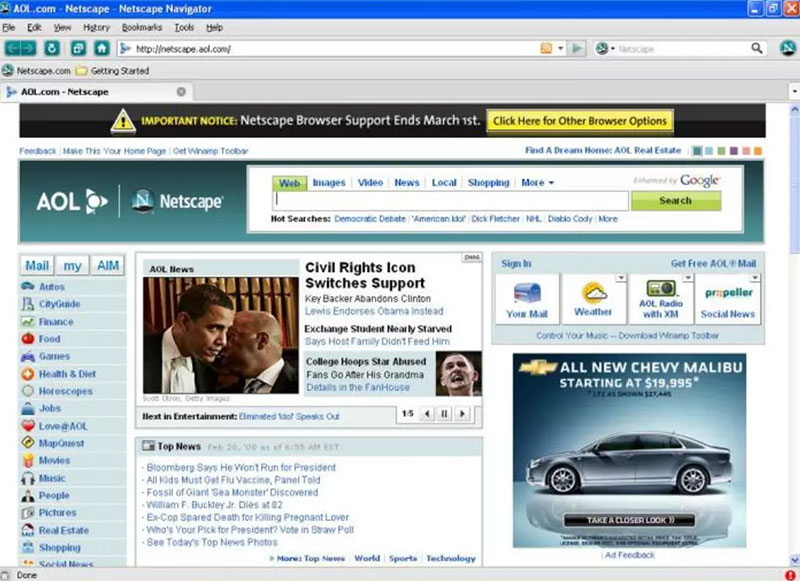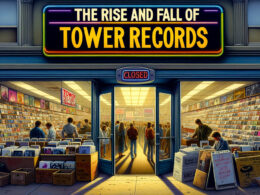Surfing to Oblivion: What Happened to Netscape?

So, let’s kick things off with a throwback. Picture it: the ’90s, a time when flannel shirts were the rage, and the internet was more of a whisper than a roar. Enter Netscape, or more formally, the Mosaic Communications Corporation. It was like the new kid on the block, but with brains and a lot of potentials.
Netscape was that cool geek who showed up with something called Mosaic Netscape 0.9.
It was their first web browser, and man, did it take the world by storm! This was no minor league play; it was the real deal. People were into it, and it was clear that something big was brewing.
Alright, let’s talk about how Netscape went from being the new kid to the one everyone wanted to hang with.
Netscape Navigator, their flagship browser, was like the Pied Piper leading folks to the internet. It wasn’t just a browser; it was a passport to a new world.
But wait, there’s more! Netscape wasn’t just about getting people online; it was also about building the online world.
These folks dropped something called JavaScript on us. And trust me, this was no small contribution. It was like giving builders the bricks to construct the digital world we now can’t live without.
The Rise of Netscape
Early Dominance
So, here’s where things get spicy. Netscape wasn’t just sitting pretty; they were running the show.
They were the big dogs, the head honchos of the web world. Innovation was their middle name, and they were setting the pace for everyone else.
And then came the IPO. IPO stands for Initial Public Offering, basically when a company goes from keeping its shares in a tight circle to selling them to the public.
Netscape’s IPO? Groundbreaking. It wasn’t just a success; it was like a rocket that started the whole dot-com bubble craze. Money was flowing, and Netscape was riding the wave.
Netscape’s Pioneering Features
But hey, let’s not forget why everyone was going gaga over Netscape. They rolled out this cool thing called Netscape Navigator, and it wasn’t just any old browser.
It was like a Swiss Army knife for the internet, packed with features.
And get this, they weren’t just building tools; they were laying down the laws. Netscape was all about developing key internet standards.
Think of them as the rule-makers, setting up the guidelines for how the internet should work. They were the trendsetters, and everyone else was just playing catch-up.
The Browser Wars
Competition with Microsoft
So, here’s the scoop on the epic showdown that had everyone talking. Netscape was chillin’ at the top, but then, boom! Along came Microsoft.
They weren’t just dipping their toes in the water; they cannonballed right into the deep end with Internet Explorer.
Microsoft’s game was strong. They had their own playbook and, let’s just say, they played hard.
They weren’t just looking to join the party; they were looking to crash it, big time. The competition was fierce, like two titans clashing. What happened to Netscape during this time was like a plot twist in a blockbuster movie.
The Battle for Market Share
Now, this wasn’t just a little tiff. It was a full-on brawl for who gets to rule the web. Netscape Navigator and Internet Explorer were going head-to-head, feature for feature.
It was like watching two tech gladiators in a showdown.
But here’s where the plot thickens. Users started to lean towards Microsoft’s offering. Was it the features? Was it the aggressive tactics? Who knows?
The shift was real, and Netscape felt the ground slipping beneath their feet.
Netscape’s Decline
Strategic Missteps

Let’s chat about the “uh-oh” moments. Netscape had a bright idea, but it was kinda like deciding to rebuild your house while you’re still living in it.
They wanted to rewrite their browser’s code. Ambitious? Yes. Risky? Absolutely.
The clock was ticking, and delays were piling up. People were expecting a sports car, but Netscape was adding too much stuff.
It was turning into a feature-bloated monster truck instead.
Financial and Market Pressures
Alright, time to talk money. Netscape was raking in the dough, but then the tides turned. Profit turned to loss, and the balance sheets were seeing more red than green.
And get this: Netscape decided to give away their browser for free. Sounds cool, right? But this move was more like a double-edged sword. It was bold, it was gutsy, but it also had folks scratching their heads about what happened to Netscape’s financial game plan.
The Acquisition and Aftermath
AOL’s Role
Alright, picture this: Netscape, once the king of the hill, is now looking a bit shaky. Enter AOL, the big shot with deep pockets.
They saw an opportunity and swooped in. Acquisition is just a fancy word for buying a company, and that’s exactly what AOL did with Netscape.
But here’s the kicker: once AOL took the reins, things started to change, and not for the better.
The vibe was different, and the focus on developing cool new stuff? Yeah, that started to fizzle out.
It was like watching your favorite band change their tune and wondering, “What happened to Netscape that we all knew?”
The End of Netscape Navigator

So, we’re at the part of the story where it’s time to say goodbye. Netscape Navigator, the once-revolutionary browser, got the short end of the stick.
It was discontinued, and just like that, an era came to an end.
But it’s not all doom and gloom. From the ashes of Netscape Navigator, something new was born.
The Mozilla Foundation took the baton and ran with it, giving us Firefox. It was like a phoenix rising, and it gave a glimmer of hope to all the Netscape fans out there.
Analysis of Failure
Product Strategy Mistakes
Let’s break it down. Netscape had a plan, but sometimes even the best-laid plans go sideways.
Their product planning and execution started to miss the mark. They were trying to hit a moving target in a market that was changing faster than fashion trends.
And adapting? That’s crucial. But for Netscape, it was like trying to dance to a new tune when they still hadn’t mastered the old one. The result? A bit of a stumble.
External Factors
But hey, it wasn’t all on them. The tech world is a wild ride, and sometimes external forces come into play.
Microsoft was like the new heavyweight champion, flexing its muscles and dominating the market.
And then there was the dot-com bubble. Imagine a balloon inflating to epic proportions, and then—pop! That’s what happened to the tech market, and the timing? Let’s just say it could have been better for Netscape.
Legacy of Netscape
Technological Contributions
So, let’s chat about Netscape’s tech magic, shall we? Picture a world before JavaScript – pretty bland, right?
Well, Netscape was the cool kid who brought JavaScript to the party. And oh boy, did it make waves! It’s like the secret sauce that makes web pages interactive and, you know, fun.
Fast forward to now, and JavaScript is like the air we breathe in the web world. It’s everywhere! And it’s not just about fancy effects on websites. It’s the backbone of some of the most important web applications we use every single day.
But wait, there’s more! Netscape didn’t just stop at JavaScript. They were like the cool older sibling for the web browsers that came after. They set the bar, pushed the envelope, and got everyone thinking, “Hey, we can make the web even cooler!” Talk about leaving a mark, right?
Lessons Learned
Now, let’s get real about what went down and what we can pick up from Netscape’s story. First off, focus is key. Like, laser focus. Netscape had a good thing going, but somewhere along the line, they lost sight of what mattered most: the users and their experience.
Then there’s the whole ‘feature creep’ thing. It’s like when you keep adding sprinkles to your ice cream until it’s more sprinkle than ice cream. Sounds fun, but it’s a mess. Netscape got a little carried away with features, and it started to bog them down.
Strategic planning, or the lack of it, is another lesson to bookmark. The web’s a wild ride, and without a solid plan, you’re just winging it. And winging it in the tech world? Not the best idea.
FAQ On What Happened To Netscape
Why did Netscape eventually fall behind in the browser wars?
So, what went down with Netscape, right? It’s like, back in the day, they were top dog, but then Microsoft rolled up with Internet Explorer.
Microsoft had this massive reach ’cause they bundled IE with Windows.
Netscape was playing catch-up, but they made some iffy calls, like rewriting their browser from scratch. That took ages, and it was a bit of a mess. Plus, giving away the browser for free? Bold move, but it hit their profits hard. Tough times, man.
Was it Microsoft’s aggressive tactics that caused Netscape’s downfall?
Absolutely, Microsoft played hardball. They didn’t just create a browser; they pushed it into every new computer with Windows.
It’s like having a lemonade stand and then some big company hands out free lemonade in front of your house! And they had deep pockets, so they could keep it up.
Netscape, well, they struggled to keep pace with this kind of muscle. So yeah, Microsoft’s tactics? They were a heavyweight punch.
How did the introduction of Internet Explorer impact Netscape?
When Internet Explorer entered the scene, it was like a plot twist nobody saw coming. Netscape was cruising, but IE came with Windows, which was everywhere. Suddenly, Netscape wasn’t the only choice.
People started drifting towards IE ’cause it was right there, ready to go on their desktops. And Microsoft kept updating IE, making it snappier. It was like Netscape was running a marathon, and Microsoft hopped in on a bike.
What role did the dot-com bubble have in Netscape’s decline?
Oh, the dot-com bubble? It was like a party that got way out of hand. Netscape’s IPO kicked it off, with everyone throwing money at anything web-related. But then reality hit.
The bubble burst, and money dried up faster than a puddle in the desert. Netscape, caught in this storm, had a tougher time getting the funds they needed to duke it out with Microsoft. Bad timing, you know?
What strategic mistakes did Netscape make during its decline?
Strategic oopsies? Netscape had a few. Rewriting their browser code was a gamble that didn’t pay off. It was like they were building a rocket ship while others were already in orbit.
Then, they had this feature bloat – cramming in all sorts of stuff that made their browser sluggish. And their vision got blurry; they lost focus on what made them great in the first place. It was a bit of a spaghetti mess.
What happened after AOL acquired Netscape?
AOL swooping in to buy Netscape was like a twist in a soap opera. You’d think it’d be a fresh start, but nah. AOL was more into dial-up and content; they didn’t really know what to do with a browser.
Development kinda slowed to a crawl, and Netscape got lost in the shuffle. It’s like they were put on the back burner while AOL cooked up other plans.
How did the transition to the Mozilla Foundation affect Netscape?
When Netscape shifted gears and supported the Mozilla Foundation, it was like passing the torch. They opened up their code, which was pretty bold. It gave birth to Firefox, which was like a phoenix rising from Netscape’s ashes.
But for Netscape itself? It marked the end of the road. It was like they admitted the race was over for them, but they wanted their legacy to keep running.
Did Netscape’s initial success contribute to its eventual downfall?
Ironically, yeah. Netscape’s blockbuster IPO and early wins were like a siren’s song – they attracted heaps of attention and competitors. They were trailblazers, but that also put a target on their backs.
It’s like they were the first to climb a mountain but didn’t plan for how to stay at the peak. Their success made waves, but those waves eventually got too big for them to surf.
What was Netscape’s lasting impact on the internet and web browsers?
Netscape’s impact? Huge. They were the OGs who brought the internet to the masses. Think about JavaScript – that was all them. Every interactive website you see? That’s Netscape’s DNA right there.
And their open-source move with Mozilla laid the groundwork for a more diverse browser landscape. It’s like they planted seeds that grew into a whole forest of web innovation.
What lessons can tech companies learn from Netscape’s rise and fall?
Netscape’s story is like a treasure map for tech companies. It shows the value of innovation but also the dangers of not adapting fast enough. It’s a reminder to stay user-focused and not get lost in the tech weeds.
Plus, it highlights how cutthroat the industry can be. Basically, it’s telling companies, “Be bold, be agile, and keep your eyes on the road ahead – ’cause it’s a wild ride.”
Conclusion
Alright, so let’s take a step back and look at the big picture. When we chat about what happened to Netscape, it’s like we’re talking about a blockbuster movie – epic rise, dramatic twists, and an unexpected finale.
Netscape wasn’t just another company; it was a trailblazer, a pioneer. In the early days, it was like the king of the hill in the web browser playground. But then, the plot thickened, and things got rocky. Even though it ended up taking a backseat, its influence didn’t just fade away.
Think of it this way: If the internet was a vast, uncharted galaxy, Netscape was like the spaceship that took us on our first tour. It showed us what’s possible, and even though it’s no longer in flight, its legacy is like the constellations that guide us – always there, always shining.
So, what’s the takeaway from the whole Netscape saga? It’s a goldmine of lessons for anyone diving into the tech universe. It’s like Netscape scribbled a bunch of ‘do’s and don’ts’ in the margins of the internet’s history book.
For the tech folks setting up shop, it’s a story that says, “Hey, be bold, be innovative, but don’t lose sight of what your users need. And always have a game plan.”
Since the Netscape days, the internet has morphed into this colossal, ever-evolving beast. Web browsers are now so slick, so smart, it’s like we’re living in the future. But here’s the kicker – the seeds of this futuristic web were sown by Netscape.
Wrapping it up, what happened to Netscape is more than a ‘rise and fall’ tale. It’s a chapter in the internet’s history that’s still influencing the pages being written today. It’s a story of ambition, innovation, and learning from the bumps along the way. And as we zip around the web today, let’s tip our hats to Netscape – the maverick that started it all.
If you liked this article about what happened to Netscape, you should check out this article about what happened to THQ.
There are also similar articles discussing what happened to Compaq, what happened to Sbarro, what happened to Nortel Networks, and what happened to Sharper Image.
And let’s not forget about articles on what happened to Polaroid, what happened to Tower Records, what happened to Quibi, and what happened to Digg.
- Understanding JavaScript Loops: A Beginner’s Guide - May 16, 2024
- Trending CSS-in-JS Libraries for Developers - May 16, 2024
- Integrating External JavaScript for Enhanced Functionality - May 15, 2024








